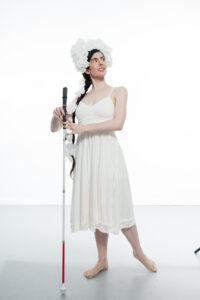Calling Up Justice believes in accessibility and disability justice, and we actively share resources that uplift these values. One such resource is Dark Room Ballet, a pioneering dance curriculum developed by Krishna Washburn specifically for blind and visually impaired dancers. Dark Room Ballet is more than a dance class; it is a movement toward inclusivity, self-trust, and artistic empowerment. It challenges traditional notions of who can be a dancer and reshapes the way dance education is approached, making it more accessible and just.
A Unique Approach to Dance Education
Dark Room Ballet is not merely an adaptation of traditional ballet techniques; it is a specialized toolbox course that equips blind and visually impaired dancers with the skills necessary to navigate and excel in the world of movement. Krishna’s curriculum focuses on essential techniques such as balance without sight, orientation through auditory and foot sensitivity, and self-correction via internal alignment. These skills are crucial for dancers who do not rely on mirrors for feedback but instead cultivate a deep internal awareness of their bodies.
Rooted in Royal Academy of Dance ballet training, Butoh, and classical Japanese dance, Dark Room Ballet offers an innovative approach that goes beyond conventional ballet instruction. Krishna Washburn, who holds a Master’s of Education from Hunter College and certifications from the American College of Sports Medicine, has dedicated years to developing a program that supports dancers at every stage of their journey—from beginners to professionals.
The Meaning Behind Dark Room Ballet
The name “Dark Room Ballet” carries profound significance. For Krishna, the dark room represents a place of transformation and development, akin to a photographer’s dark room where images emerge through chemical reactions. For blind and visually impaired dancers, it symbolizes a space where they can grow, experiment, and refine their craft without external judgment. It also reflects Krishna’s personal journey of vision loss, where adapting to a new reality led to a fearless embrace of dance.
Dark Room Ballet fosters an environment of self-exploration and confidence, where dancers learn to trust their bodies and movements deeply. It encourages students to view dance as an act of rebellion against societal expectations, a medium for self-expression, and a powerful art form that transcends sight.
Classes and Curriculum
In addition to ballet instruction, Krishna teaches No Diagram Anatomy, a course that addresses the significant gaps in anatomy education for blind and visually impaired individuals. This program ensures that students understand biomechanics in a way that aligns with their learning needs.
Furthermore, Krishna provides professional development workshops in Audio Description for Dance. These workshops challenge the limitations imposed by traditional audio description guidelines, advocating for more nuanced and dance-specific approaches.
Krishna Washburn: A Leader in Inclusive Dance Education
Krishna Washburn’s impact extends beyond Dark Room Ballet. She has performed with esteemed dance companies, collaborated with independent choreographers, and contributed significantly to accessible arts education. As Co-Director of Telephone, an activist screen dance documentary, Krishna continues to push the boundaries of inclusive performance. Her expertise is sought by universities, dance institutions, and accessibility organizations, where she educates others on self-audio description and inclusive ballet pedagogy.
As a curriculum writer, Krishna has developed lesson plans for inclusive arts education and is contributing a chapter to The Oxford Handbook for Ballet Pedagogy (2025). Her work challenges traditional dance institutions to rethink accessibility and justice in ballet education.
A Call to Dance
Dark Room Ballet is a revolutionary program that redefines what it means to be a dancer. By centering blind and visually impaired artists, it dismantles ableist assumptions and creates a space where movement is guided by intuition, trust, and artistic expression. Calling Up Justice proudly supports and shares this resource, recognizing its role in fostering a more inclusive and equitable dance community.
For those who wish to experience dance on their own terms, free from external judgment, Dark Room Ballet offers a powerful invitation: to dance in the Dark Room together, embracing movement as a radical act of self-expression and liberation.

